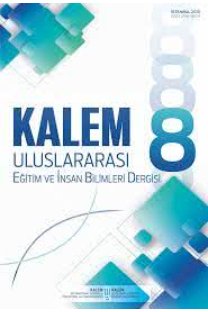Exploring Issues in Understanding Qualified Teacher Status in Initial Teacher Training: Case from Leeds University
Başlangıç Öğretmen Eğitiminde Nitelikli Öğretmen Statüsünü Anlamaya İlişkin Sorunları Belirlemek: Leeds Üniversitesi Örneği
___
- Alibaba-Erden, H. (2014a). A proposed national framework for professional teaching standards in North Cyprus. Unpublished doctoral thesis, Eastern Mediterranean University.
- Alibaba-Erden, H. (2014b). Professional teaching standards system: A proposed national framework. Saarbrücken: Scholars Press.
- Alibaba-Erden, H. and Özer, B. (2013). Identifying professional teaching standards using Rasch model analysis: The case of Northern Cyprus. Egitim Arastirmalari-Eurosian Journal of Educational Research, 53, 175-196.
- Boyce, C., and Neale, P. (2006). Conducting in-depth interviews: A guide for designing and conducting in-depth interviews for evaluation input. Pathfinder International. Retrieved January, 29, 2010 from, http://www2.pathfinder.org/site/DocServer/m_e_tool_series_ind epth_interviews.pdf. Cohen, L. (1976). Educational research in classrooms and schools. London: Harper and Row.
- Campbell, J., and Husbands, C. (2000). On the reliability of OFSTED inspection of initial teacher training: A case study. British Educational Research Journal, 26(1), 39-48. doi: 10.1080/014119200109507
- Department of Education and Science. (1984). Circular 3/84 Initial teacher training: Approval of courses. London: DES. Dewey, J. (1916). Democracy and education. New York: The Free Press.
- Fraenkel, J. R., and Wallen, N. E. (2010). How to design and evaluate research in education. (7th. ed.). Singapore: McGRaw Hill Publications. The General Teaching Council for Scotland. (n.d.). Revised Professional Standards. Retrieved December 21, 2009 from, http://www.gtcs.org.uk/standards/revised-professional-standards .aspx.
- Gulbahar, Y., and Guven, I. (2008). A survey on ICT usage and the perceptions of social studies teachers in Turkey. Educational Technology and Society, 11(3), 37-51. Retrieved February, 11, 2010 from, http://www.ifets.info/journals/11_3/4.pdf.
- Hager, P., and Butler, J. (1996). Two models of educational assessment. Assessment and Evaluation in Higher Education, 21(4), 367-378. doi: 10.1080/0260293960210407
- Kington, A., Harris, S. and Leask, M. (2002). Innovative practice using ICT in schools: findings in two case studies. Management in Education, 16(1), 31-35. doi: 10.1177/08920206020160010801
- Martin, S. (1997). Two models of educational assessment: A response from initial teacher education: If the cap fits Assessment and Evaluation in Higher Education, 22(3), 337-343. doi: 10.1080/0260293970220307
- Martin, S., and Cloke, C. (2000). Standards for the award of qualified teacher status: Reflections on assessment implications. Assessment and Evaluation in Higher Education, 25(2), 183-190. doi: 10.1080/713611425
- Miles, M., and Huberman, M. (1994). Qualitative data analysis. Beverly Hills: Sage Publications.
- Nunn, J. (2008). From the interface of policy and practices: Revising the standards for qualified teacher status in England. A travellers tale. Unpublished doctor of education thesis, Roehampton University.
- Oppenheim, A. (1992). Questionnaire design, interviewing and attitude measurement. London: Pinter.
- Patton, M., Q. (2002). Qualitative research and evaluation methods (3rd ed.). Thousands Oaks, CA: Sage Publications.
- Robson, C. (2002). Real world research. A resource for social scientists and practitioner researchers (2nd ed.). Singapore: Blackwell Publishing.
- Sachs, J. (2003). Teacher Professional Standards: Controlling or developing teaching? Teachers and Teaching, 9(2), 175-186. doi: 10.1080/13540600309373
- SQA Accreditation. (2008). Guide to assessing: Workplace core skills. Retrieved December, 12, 2009 from, http://www.sqa.org.uk/files_ccc/GuideToAssessingWorkplaceC oreSkills_Aug08.pdf
- Teacher Development Agency (TDA) (n.d.). Retrieved November, 5, 2009 from, http://www.tda.gov.uk/partners/ittstandards/qts_skills_tests.aspx
- Tedder, M., and Lawy, R. (2009). The pursuit of excellence: Mentoring in further education initial teacher training in England. Journal of Vocational Education and Training, 61(4), 413-429. doi:10.1080/13636820903363634
- TES. (1998). Warning on cloned heads. p. 12. Retrieved March, 22, 2010 from, http://www.tes.co.uk/article.aspx?storycode=75025
- Training and Development Agency for Schools. (2008). Professional standards for qualified teacher status and requirements for initial teacher training. (rev. ed.). Retrieved November, 18, 2009 from, www.tda.gov.uk/qts.
- Young, J., Hall, C., and Clarke, T. (2007). Challenges to university autonomy in initial teacher education programmes: The cases of England, Manitoba and British Columbia. Teaching and Teacher Education, 23(1), 81-93. doi: 10.1016/j.tate.2006.04.008
- White, M. E., Makkonen, R., and Steward, K. B. (2009). A multistate review of professional teaching standards. National Center for Educational Evaluation and Regional Assistance. Institute of Education Sciences: U.S. Department of Education. Regional Educational Laboratory at WestEd.
- Williams, A. (1997). Quality assessment in initial teacher education: Lessons from the 1993/94 OfSTED experience, Higher Education Quarterly, 51(2), 189-200. doi: 10.1111/1468-2273.00034.
- ISSN: 2146-5606
- Yayın Aralığı: 2
- Başlangıç: 2011
- Yayıncı: Kalem Vakfı Okulları
Öğretmenlerin Eğitim İnançları ile Meslekî Değerleri Arasındaki İlişki1
NİHAL TUNCA GÜÇLÜ, SENAR ALKIN ŞAHİN, AYTUNGA OĞUZ
Ayşegül KADI, OSMAN FERDA BEYTEKİN
HÜSEYİN ÇALIŞKAN, ZAFER TANGÜLÜ, Saliha SEVER
Pedagojik Formasyon Eğitimi Sertifika Programı Öğrencilerinin Karakter Eğitimine İlişkin Görüşleri
Bilgi Kuramında Kuantum Yaklaşımı Yöntemi
Ceyhun DEMİRKOLLU, Kudret ALTUN
9. Sınıf Rehberlik Programının Öğrenci Görüşlerine Göre Değerlendirilmesi
